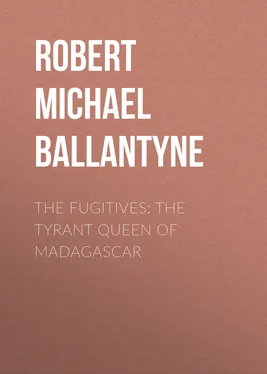Robert Michael Ballantyne - The Fugitives - The Tyrant Queen of Madagascar
Здесь есть возможность читать онлайн «Robert Michael Ballantyne - The Fugitives - The Tyrant Queen of Madagascar» — ознакомительный отрывок электронной книги совершенно бесплатно, а после прочтения отрывка купить полную версию. В некоторых случаях можно слушать аудио, скачать через торрент в формате fb2 и присутствует краткое содержание. Жанр: Детские приключения, literature_19, foreign_antique, foreign_prose, foreign_children, на английском языке. Описание произведения, (предисловие) а так же отзывы посетителей доступны на портале библиотеки ЛибКат.
- Название:The Fugitives: The Tyrant Queen of Madagascar
- Автор:
- Жанр:
- Год:неизвестен
- ISBN:нет данных
- Рейтинг книги:5 / 5. Голосов: 1
-
Избранное:Добавить в избранное
- Отзывы:
-
Ваша оценка:
- 100
- 1
- 2
- 3
- 4
- 5
The Fugitives: The Tyrant Queen of Madagascar: краткое содержание, описание и аннотация
Предлагаем к чтению аннотацию, описание, краткое содержание или предисловие (зависит от того, что написал сам автор книги «The Fugitives: The Tyrant Queen of Madagascar»). Если вы не нашли необходимую информацию о книге — напишите в комментариях, мы постараемся отыскать её.
The Fugitives: The Tyrant Queen of Madagascar — читать онлайн ознакомительный отрывок
Ниже представлен текст книги, разбитый по страницам. Система сохранения места последней прочитанной страницы, позволяет с удобством читать онлайн бесплатно книгу «The Fugitives: The Tyrant Queen of Madagascar», без необходимости каждый раз заново искать на чём Вы остановились. Поставьте закладку, и сможете в любой момент перейти на страницу, на которой закончили чтение.
Интервал:
Закладка:
“We’re done for,” said Mark, in a tone of despair, as he noted this.
“Why d’ee think so, Doctor?” asked Hockins, who did not by any means seem to take such a gloomy view of their case.
“Don’t you see? Savages can follow up people’s trails almost as well as dogs. They’ll easily trace us to the foot of this tree by our footprints, and then they’ve only to look up!”
“That’s true. I had forgotten that.”
“Dere’s time to drop down yit, massa, and squatilate,” suggested the negro, excitedly.
Mark shook his head.
“Might as well try to run from tigers as from savages,” he returned, “unless you’ve got a good start.”
“But they ain’t all savages, sir,” whispered Hockins, as the band drew nearer. “Some o’ the naked black fellows look savage enough, no doubt, but there’s a lot of ’em lightish brown in the skin, an’ clothed in fine though queer garments. They carry themselves, too, like gentlemen. P’r’aps we’d better go for’ard an’ trust them.”
“Trust to ’em, ’Ockins!” said Ebony with a decided shake of the head, “trust men wid brown faces? Nebber!”
The whispered conversation ceased at this point for a loud shout of surprise mingled with alarm was raised as the band came to the foot of the cliff and found what appeared to be the dead body of the wounded man. Evidently they were friends, for while some of them kneeled down beside the injured hunter to examine him, others gave way to gestures and exclamations of grief.
Presently the watchers observed that one of those who kneeled beside the body looked up with a smile and a nod of satisfaction as he pointed to his chest.
“They’ve discovered that he’s not dead,” said Mark.
“Yes, massa, an’ dey’ve diskivered de bandaged arm.”
“Ay, an’ it seems to puzzle ’em,” added the seaman.
It did more than puzzle them. They had not observed it at first, because, just before running into the woods, Mark had covered it with a loose shawl—a sort of linen plaid—which the man had worn round his shoulders. When they removed this and saw the bandage which was wound round the limb in the most careful and perfect manner, they looked at each other in great surprise; then they looked solemn and spoke in low tones, glancing round now and then with saucer-like eyes, as if they expected to see something frightful.
“I do believe, Doctor,” whispered the seaman, “that they think your work has been done by a goblin of some sort!”
It would indeed seem as if some such idea had entered the minds of the band, for instead of examining the ground for footprints and following them up—as was natural to have done—they silently constructed a litter of branches, covered it with some of their garments, and quietly bore the wounded and still unconscious man away in the direction of the plains.
With thankful hearts our travellers slid to the ground, and hurried off in the opposite direction towards the mountains.
That night they came to a deeply-shaded and rugged piece of ground in the heart of the forest where there were caverns of various sizes. Here the solitude seemed to be so profound that the fear of pursuit gradually left them, so they resolved to kindle a cheerful fire in one of the caves, cook a good supper, and enjoy themselves. Finding a cave that was small, dry, and well concealed, they soon had a bright fire blazing in it, round which they sat on a soft pile of branches—Mark and Hockins looking on with profound interest and expectation while the negro prepared supper.
“If I only had a quid o’ baccy now,” said Hockins, “I’d be as happy as a king.”
“I have the advantage of you, friend, for I am as happy as a king without it,” said the young doctor.
“Well, there’s no denyin’,” returned the seaman, “that you have the advantage o’ me; but if I only had the baccy I’d enjoy my disadvantage. P’r’aps there’s a bit left in some corner o’—”
He plunged his hands into each pocket in his garments, one after another, but without success until he came to the left breast-pocket of his coat. When he had searched that to its deepest recesses he stopped and looked up with a beaming countenance.
“Ho! got ’im?” asked Ebony, with interest.
Hockins did not reply, but, slowly and tenderly, drew forth—not a quid, but—a little piece of brown wood about five or six inches long.
“A penny whistle!” exclaimed Mark.
“Speak with reverence, Doctor,” returned the sailor, with a quiet smile, “it ain’t a penny whistle, it’s a flageolet. I stuck it here the last time I was amoosin’ the crew o’ the Eastern Star an’ forgot I hadn’t putt it away. Wait a bit, you shall hear.”
Saying this Hockins put the tiny instrument to his lips, and drew from it sounds so sweet, so soft, so melodious and tuneful, that his companions seemed to listen in a trance of delight, with eyes as well as with ears!
“Splendid!” exclaimed Mark, enthusiastically, when the sailor ceased to play. “Why, Hockins, I had no idea you could play like that! Of course I knew that you possessed musical powers to some extent, for I have heard the tooting of your flageolet through the bulkheads when at sea; but two or three inches of plank don’t improve sweet sounds, I suppose.”
“Ho! massa, didn’t I tell you t’ree or four times dat he play mos’ awrful well?”
“True, Ebony, so you did; but I used to think your energetic praise was due to your enthusiastic disposition, and so paid no attention to your invitations to go for’ard an’ listen. Well, I confess I was a loser. You must have played the instrument a long time, surely?”—turning to the seaman.
“Yes, ever since I was a small boy. My father played it before me, and taught me how to finger it. He was a splendid player. He used sometimes to go to the back of the door when we had a small blow-out, an’ astonish the company by playin’ up unexpectedly. He was great at Scotch tunes—specially the slow ones, like this.”
He put the little instrument to his lips again, and let it nestle, as it were, in his voluminous beard, as he drew from it the pathetic strains of “Wanderin’ Willie,” to the evidently intense enjoyment of Ebony, who regarded music as one of the chief joys of life—next, perhaps, to cooking!
But Mark and Ebony were not the only listeners to that sweet strain. Just outside the mouth of the cave there stood a man, who, to judge from the expression of his face, was as much affected by the music as the negro. Though he stood in such a position as to be effectually screened from the view of those within, a gleam of reflected light fell upon his figure, showing him to be a tall, handsome man in the prime of life. He was clothed in what may be styled a mixed European and native costume, and a gun on which he rested both hands seemed to indicate him a hunter. He carried no other weapon, except a long knife in his girdle. The mixed character of his garb extended also to his blood, for his skin, though dark and bronzed from exposure, was much lighter than that of most natives of the island, and his features were distinctly European. Quiet gravity was the chief characteristic of his countenance, and there was also an expression of profound sadness or pathos, which was probably caused by the music.
When Hockins finished his tune the three friends were almost petrified with astonishment—not unmingled with alarm—as they beheld this man walk coolly into the cave, rest his gun on the side of it, and sit gravely down on the opposite side of the fire.
The first impulse of our three friends, of course, was to spring up, but the action of the man was so prompt, and, withal, so peaceful, that they were constrained to sit still.
Читать дальшеИнтервал:
Закладка:
Похожие книги на «The Fugitives: The Tyrant Queen of Madagascar»
Представляем Вашему вниманию похожие книги на «The Fugitives: The Tyrant Queen of Madagascar» списком для выбора. Мы отобрали схожую по названию и смыслу литературу в надежде предоставить читателям больше вариантов отыскать новые, интересные, ещё непрочитанные произведения.
Обсуждение, отзывы о книге «The Fugitives: The Tyrant Queen of Madagascar» и просто собственные мнения читателей. Оставьте ваши комментарии, напишите, что Вы думаете о произведении, его смысле или главных героях. Укажите что конкретно понравилось, а что нет, и почему Вы так считаете.












